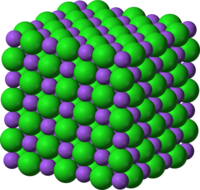
Photo from wikipedia
Abstract We investigated anisotropic thermoelectric properties of (CuI)xBi2Te2·7Se0.3 (x = 0.0, 0.3, 0.6, and 0.9 mol.%) compounds, synthesized by the hot-press and hot-deformation process. In spite of polycrystalline compound, the hot-deformed compounds exhibit… Click to show full abstract
Abstract We investigated anisotropic thermoelectric properties of (CuI)xBi2Te2·7Se0.3 (x = 0.0, 0.3, 0.6, and 0.9 mol.%) compounds, synthesized by the hot-press and hot-deformation process. In spite of polycrystalline compound, the hot-deformed compounds exhibit preferred orientation along the c-axis, parallel with the applied press direction. The sample of x = 0.3 mol.% shows the maximum power factor (3.8 mW m−1 K−2 at 300 K) and ZT value (0.97 at 423 K), which is relatively high thermoelectric performance in n-type thermoelectric materials as a mild-temperature operation. Notably, the in-plane lattice thermal conductivity of the x = 0.3% compound with covalent bonding layer has lower value than the one of out-of-plane lattice thermal conductivity with van der Waals bonding layer. From the high resolution transmission electron microscopy and electron diffraction measurements, we observe the lattice distortion of the x = 0.3% compound. Therefore, the unconventional anisotropic lattice thermal conductivity can be associated with the lattice distortion along the in-plane on the compound driven by the CuI doping.
Journal Title: Journal of Alloys and Compounds
Year Published: 2020
Link to full text (if available)
Share on Social Media: Sign Up to like & get
recommendations!